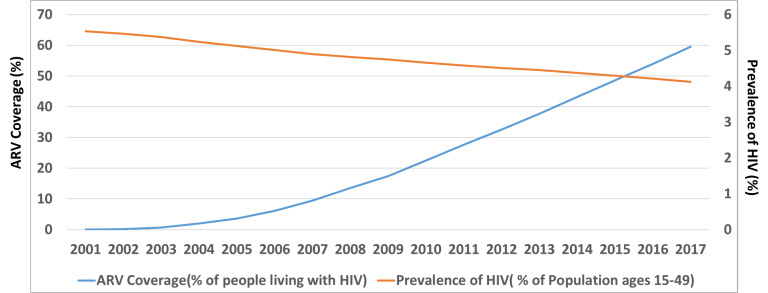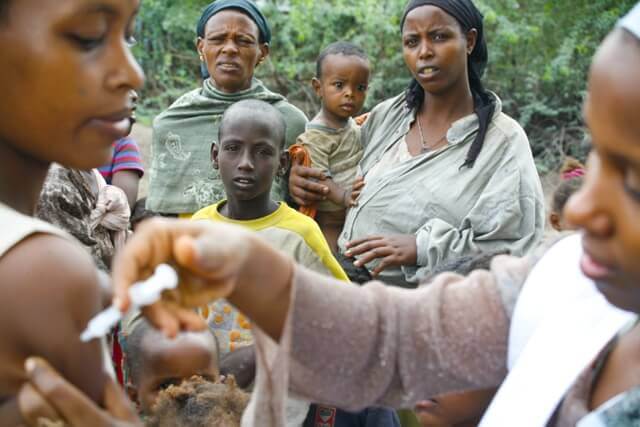Africa makes up 11 per cent of the world’s population but has a share of 24 per cent in the disease burden. It is hoped the introduction of Prime Minister Modi's "Ten Guiding Principles" to enhance Global South-South cooperation will build on India's historic relationship with Africa to tackle the numerous systemic and structural issues plaguing Africa's health sector.
There is a significant dearth of qualified doctors in Africa, with brain drain estimated to have cost Sub-Sarahan countries $2 billion, spent training doctors who migrated to developed nations. Much of the financial aid its healthcare sector receives is disease and event-driven, like after the Ebola epidemic, and fails to target the lack of capacity among healthcare professionals in the region.
Recognizing Africa's need for capacity building, infrastructural development and enhanced cooperation in drugs and diagnostics, India has extended strong healthcare and pharmaceutical support to Africa, often to eradicate fatal diseases such as HIV/ AIDS, malaria, TB and other pandemics.
India's reliable, large, and well-regulated health sector provides affordable medicine and medical personnel through drug subsidies on pharmaceutical exports to Africa, and by the cooperation of Indian medical professionals with their African counterparts for interrelated action on common diseases.
The ease of doing business between India and most African nation is boosted by the connectivity provided by the Indian Ocean and the Africa-India Growth Corridor. Africa presently imports between 70-90 per cent of its drugs, with India being the third-largest pharmaceutical supplier to South and West Africa. Barring Rwanda, the import of Indian healthcare services is also high in the East African nations of Ethiopia, Tanzania, Kenya and Mozambique. Indian private pharmaceutical firms such as Ranbaxy, Cipla and Dr. Reddy have a strong presence in East Africa, and are the largest exporters of drugs to Sub-Saharan Africa, followed by China. India’s exports of pharmaceutical products to Africa grew from $247.64 million in 2000 to a whopping $3.5 billion in 2014.
India’s cheap drug manufacturing and cost-effective pharmaceuticals have enabled African nations to access low-cost, high-quality medicines. For instance, in early 2001, only one out of a thousand Africans had access to Antiretroviral (ARV) medication, severely limiting the continent's ability to confront the HIV/AIDS epidemic. In response, the Indian pharmaceutical firm Cipla provided three-segment ARV treatment to Africans at a cost of only $350 a year per person, a quarter of the market price. In fact, according to Janice Lee, a pharmacist who worked with medical teams for Médecins Sans Frontières (MSF) projects in Liberia and Zimbabwe, 80% of the AIDS medicines that the MSF Access Campaign used in Africa were made by Indian companies. Additionally, Indian medical equipment such as “Bhabhatrons” and phototherapy devices have significantly contributed to technical advances in Africa’s healthcare. In 2014, India donated one million doses of the foot-and-mouth disease (FMD) monovalent vaccine, worth $480000, to Algeria.

Alongside the provision of drugs, treatments, and technology, India has also invested significant amounts of money in Africa's healthcare infrastructure. Under the Madiba-Mahatma Initiative, the Exports-Imports Bank of India built an India-Africa Health Fund of $10 million, and an additional $10 billion as LoC. This fund has been created to foremostly develop and build tertiary hospitals in six to eight African cities. Additionally, Dr Agarwal’s eye hospital has ten branches ten across Africa, and Apollo Healthcare has opened multi-speciality hospitals in South Africa, Mauritius, Ethiopia, Tanzania, Zimbabwe, Ghana and Nigeria.
Meanwhile, Indian diplomatic missions in Africa have also taken up the cause of healthcare cooperation. In 2014, the Indian Embassy at Addis Ababa conducted the first-ever free eye care camp for Ethiopians. Furthermore, A Memorandum of Understanding (MoU) on India-Africa Health Sciences Cooperation was signed between the Indian Council of Medical Research (ICMR) and the African Union (AU) in New Delhi earlier this year. The MoU aims to formally recognize the health sector partnership between the ICMR and the AU as a part of the India-Africa Health Sciences Collaborative Platform (IAHSP). India also has several other agreements with the AU to open avenues for collaboration in the health sector, such as the triennial India-Africa Forum Summit, the Duty-Free Tariff Preference Scheme, and the Pan African e-Network (PAe-NP).
Therefore, through strategic and economic cooperation, India assists in addressing the lack of capacity and infrastructural deficiencies in Africa's healthcare system. Both India and Africa's health industries are faced with similar challenges-such as malnutrition, poverty, pollution, and diseases like TB and malaria-and must learn to tackle these challenges together through the exchange of resources. This cooperation, facilitated by their respective governments, will lead to higher quality and affordable healthcare which can combat chronic diseases, health crises, and systemic and structural issues in the health industry. Simultaneously, as India-Africa ties grow, it is vital to place a greater focus on conventional medicinal practices such as Ayurveda and African traditional healing to promote sustainable indigenous healthcare that can act as eco-friendly and natural alternatives to chemically sustained medicines and drugs.

